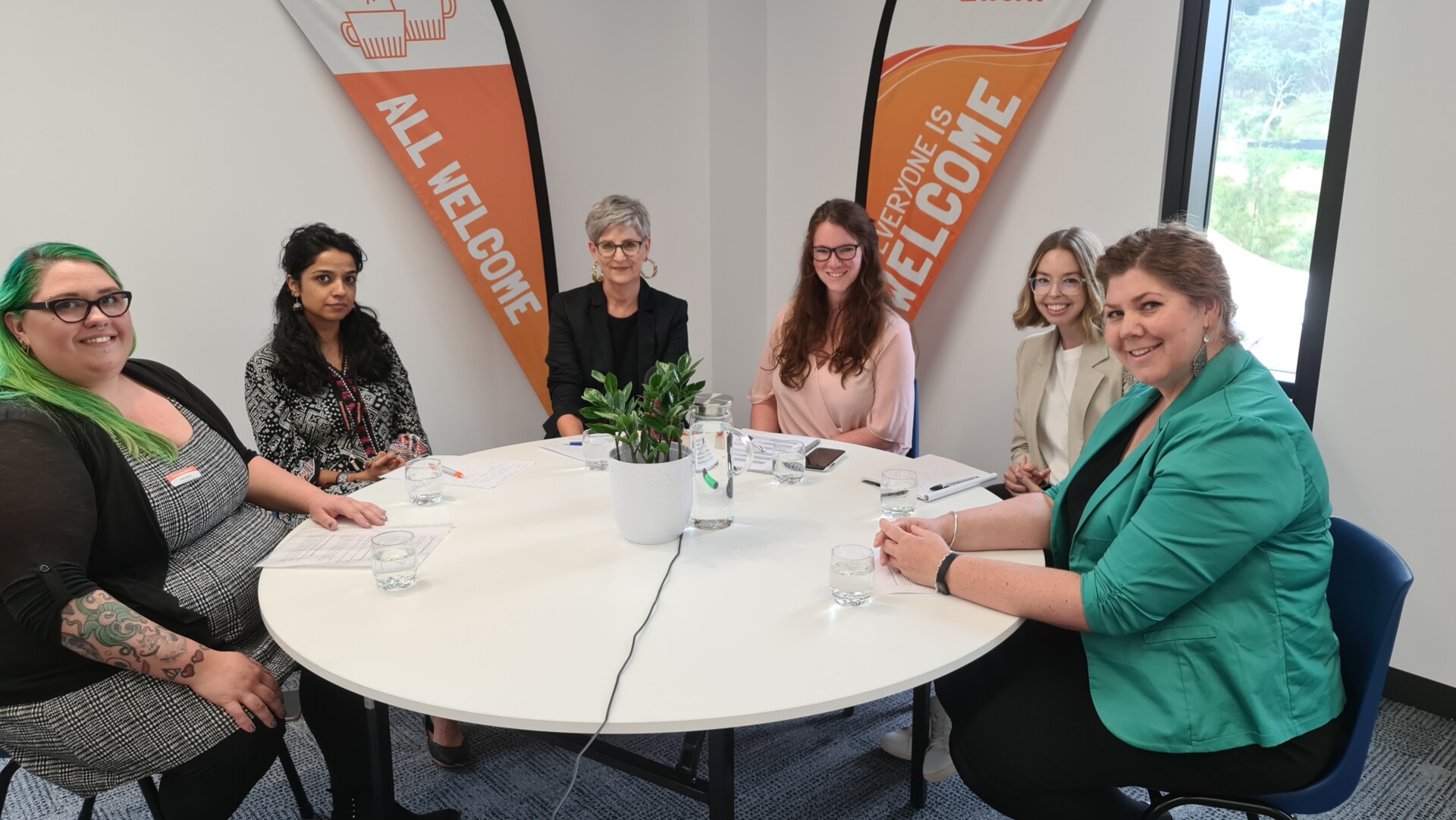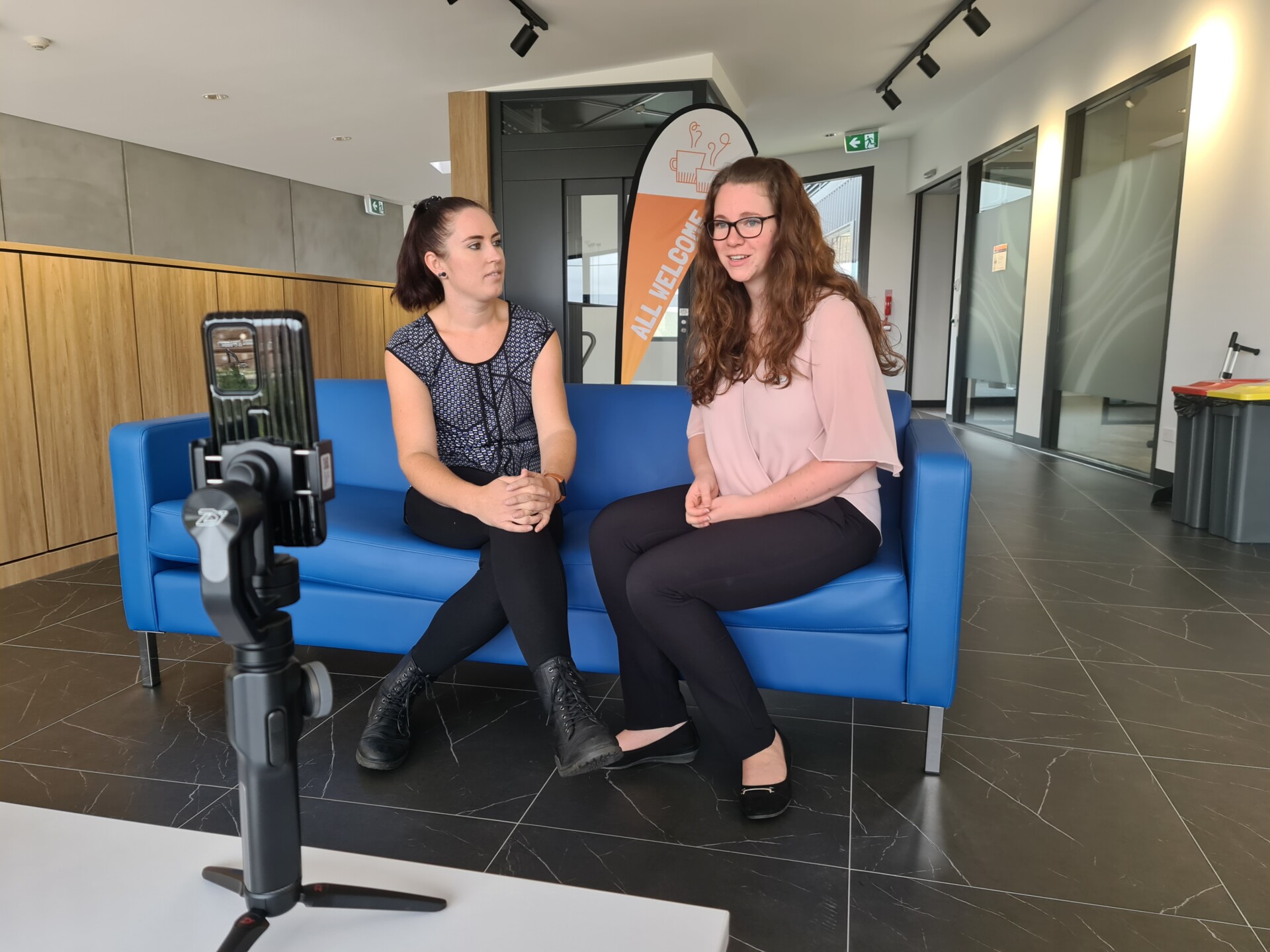3, 2, 1… We're LIVE! We were excited to host our first-ever live-streamed discussion panel earlier this month at Communities at Work (on 8 March 2022). And what better topic to kick off with than Women in Leadership, a thought-provoking chat about gender equity on International Women's Day with five remarkable women from across Communities at Work.

Keeping the Conversation Going on Gender Equity and Women in Leadership
At Communities at Work, we are proud to have an impressive number of women in leadership positions. We take pride in fostering a sense of belonging, encouraging career progression, and promoting gender equity in our workplaces across Canberra.
On 8 March 2022, in honour of International Women’s Day (#IWD2022), we hosted a panel discussion with five inspiring women leaders from our organisation. Two roving reporters from our team also spoke to different women across the various program areas (and various locations in Canberra) at Communities at Work throughout the day, in the lead-up to the live panel discussion. The panel was hosted on our Facebook page, keeping the conversation going on gender equity and women in leadership in the workplace.
Let’s meet our panellists
- Melita Pendergast – Manager of two early education and care centres
- Jo Cochrane – Director of Lifestyle Services program
- Anita Senjic – Senior Educational Leader at our Out of School Hours Care service
- Tess Hutchison – Coordinator of the Seniors Program
- Natasha Zulfiqar – Teacher at Galilee School for vulnerable youth
- Alanah MacMahon – Panel Facilitator, Marketing team
These women urged us to challenge the future and ‘break the bias’ by inspiring, moving and wryly amusing us as they shared their personal stories, experiences and thoughts on leadership, success, feminism and gender equity.
There were so many great takeaways from the discussion, not just on women in leadership, but also on success, gender stereotypes, feminism and more, that we just had to share some of them with you and keep the conversation going.
On Leadership
Becoming a great leader isn’t just somebody coming up to you and saying, “I think you’d be a great leader. You should go for it”. It’s somebody saying “I think you’d be a great leader. Here’s some training that you can do to support yourself”. I was put through some really great training with Communities at Work’s RTO (The Centre of Professional Learning and Education) that showed me that even with my personality, I could be a leader. I didn’t have to change who I was. The training gave me the skills that I needed, to use what I already had, in order to lead a team.
– Melita
*
I don’t think there is a set personality to lead; rather that there are qualities that a good leader has. When I see young children playing, often ‘bossy’ girls will take charge of the group, assign roles, and say “this is the game we’re playing”. They have a big picture vision and good communication skills. They’re able to delegate, organise, and get people to come on board. What we’re actually seeing is the development of leadership. So instead of calling them ‘too bossy’, we should be recognising that they’re developing the qualities of good leadership and find healthy ways to expand on that and build the children’s confidence rather than knocking it out of them.
– Melita
*
On Success
Our current definition of success is very male-dominated and vertical: we’re told we need to move on, that more is always better. But is that necessary? Does success have to be reaching the top of the line? I don’t feel like I need to be higher up. What success looks for me, is going to be very different to what it looks like for you.
– Natasha
*
Sometimes it’s a challenge to say that my level of success looks linear. I might like to pivot left or right instead of travelling up this ladder of hierarchy that people impose on us.
– Anita
*
To me, success is supporting other people to succeed. Those are the small victories that other people might not even consider a victory. But it’s the little things that are so important.
– Melita
*
On Gender Stereotypes
There are a lot of gender stereotypes in the books we read to children. Remember ‘Wheels on the Bus’? The babies on the bus go ‘Whah, Whah, Whah’. The mummies on the bus go ‘Shoosh, Shoosh, Shoosh’. And what are the daddies on the bus doing? ‘Read, Read, Read’. But rather than ban a book, read it and use it as a talking point and say, “You know, isn’t it interesting in that book that the mum was in the kitchen? Sometimes the mums can cook and sometimes the dads can cook”. Really open the children’s eyes to different possibilities.
– Melita
*
Even the language we use with children often has a gender bias without us realising it. At our centre, when we give children dirty clothes to take home, we used to say “take that home for mum to wash” or “give that to dad to fix”. But now we’re starting to purposefully say to children “take it home for dad to wash”. One boy looked at me and said “but my dad doesn’t know how to use the washer”. So I asked him how his father could find out how to use the washer and he said, “maybe he could look it up on YouTube”.
– Melita
*
It’s also a lot about accountability. And it starts with us: our personal biases, how they impact our co-workers, our community, the children we work with. We need to listen to other people, have an open mind, be more willing to see someone else’s perspective.
– Anita
*
Everyone has biases. But sometimes we have to check to make sure that we’re not part of the biased opinion, and that we’re flexible because we need to be part of the solution.
– Jo
*
On Feminism
People have put a negative connotation on ‘feminism’. Why does the word make people feel threatened?
– Natasha
*
It’s not about women hating men or women trying to be better than men. You just want to champion your gender, you just want to champion equitable opportunities. When others recognise that and understand that it would be a great start to counteract those negative stereotypes.
– Anita
*
Interestingly, by telling us to be quiet, they made us more assertive. Which made us champion feminism more.
– Natasha
*
I come from generations of farmers in my family on both sides. The women ran the farms. They did everything. I was expected to do the same farm work as my brothers. No one thought ‘she can’t do that because she’s a girl.’ I don’t believe that I’m any less of a person because I’m female. It’s just who I am.
– Melita
*
Roving Reporter with Interviewee – in conversation with Chloe (left), Trainer at our Centre of Professional Learning and Education
On Gender Equity
In the book Invisible Women, author Caroline Criado Perez talks about how society is biased against women just because they haven’t taken us into consideration. For instance, the size of a standard house brick is actually too big for the average female to wrap their hands around, making it challenging for a female bricklayer. Similarly, for women in the military and defence, the equipment isn’t designed for them so they have a lot more injuries.
– Melita
*
We need changes, but changes can start at a family level. I have a family group on WhatsApp with eight uncles on it. They’ve been posting sexist jokes for years and I’ve been fighting to get the group to stop sending them. But my dad used to say to me, “You can’t speak to your elders like that. You can’t tell them what to do.” But I kept fighting. And no one listened. Finally, one day my dad told the group, “It’s making her uncomfortable. Stop”. When I spoke they didn’t listen. When a man spoke, they stopped. But at least they stopped. It’s a small victory.
– Natasha
*
We also need to support the men and boys. I grew up in an era where boys weren’t allowed to cry. But we’re recognising now that encouraging boys to suppress their emotions isn’t healthy. I watched a Ted Show recently where an American football coach says to one of his players, “You need to woman up”. And his player goes, “Don’t you mean ‘man up’?” And the coach goes, “Well, that’s what you’ve been doing – and it’s clearly not working”.
– Melita
*
(We just loved that!).
Missed out on the event?
Don’t worry – we have plenty of options to catch you up:
- Live discussion panel – If you missed the live panel discussion you can view the recording here on our Facebook page.
- Roving Reporter interviews – Check out the Highlights tab “IWD 2022” on our Instagram page (@commsatwork) to view our Roving Reporters visiting clients and employees across our organisation on International Women’s Day and chatting about gender equity.
- Video highlights – View the highlights reel of both these events in this wrap-up video below, or click here to watch the video in a new tab.
Working with Us
We are very proud of the men and women that work with Communities at Work, and we strive to create a culture and environment that supports all our employees in their professional development and career path. If you were inspired by our panellists and are thinking of working with our organisation, we would love to hear from you. You can check out our latest job opportunities on our Careers Page.
Communities at Work is Canberra’s largest not-for-profit community organisation, and the largest provider of Early Education and Care. We employ a large number of employees across a number of teams and program areas, and our people are proud to work with us. Find out more about working with us here.
Want us to discuss a topic?
If there’s a topic you would like us to explore for our next live discussion panel, we’d love to hear your ideas. Email marketing@commsatwork.org

